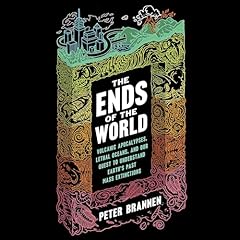
The Salton Sea
The History of America’s Most Unique Lake
No se pudo agregar al carrito
Add to Cart failed.
Error al Agregar a Lista de Deseos.
Error al eliminar de la lista de deseos.
Error al añadir a tu biblioteca
Error al seguir el podcast
Error al dejar de seguir el podcast
 Exclusivo para miembros Prime: ¿Nuevo en Audible? Obtén 2 audiolibros gratis con tu prueba.
Exclusivo para miembros Prime: ¿Nuevo en Audible? Obtén 2 audiolibros gratis con tu prueba.Compra ahora por $9.76
-
Narrado por:
-
David Van Der Molen
In the list of popular American geological oddities and attractions, one sizeable phenomenon remains surprisingly unfamiliar to the average citizen. This may be due in part to its remote desert location, but perception of the Salton Sea in Southern California is also laden with environmental concerns and is in a constant state of flux. The extensive body of inland saltwater hides a glorious commercial past and has served as an important wildlife preserve but approaches a seemingly inevitable crisis in the coming decade.
The Salton Sea in not directly “on the way” to anything substantial or iconic and is situated one hour’s drive from Palm Springs, 30 miles to the south of Indio, California, on Highway 111. Its distance from Los Angeles and San Diego is approximately three hours' driving time. The most recognizable natural phenomenon of Imperial and Riverside counties, it is surrounded by a rural area comprised of predominantly migrant farm workers and located in the Southern Colorado desert area known as the Salton Trough, or Salton Sink.
Despite being a natural occurrence filling and emptying intermittingly throughout history, the current presence of this large inland sea surrounded by sand was created accidentally in the early 20th century. First formed around 700 CE, the original and much larger version of the great inland lake was called Lake Cahuilla, connected to the Sea of Cortez. By the time the first Europeans arrived in the 16th century, the basin was completely dry as Don Juan Bautista led the first party across the basin’s expanse.
Connected to the Gulf of California until 4.5 million years ago, the Colorado River’s constant output of silt eventually blocked off the gulf and separated the region from the Pacific. In the centuries since, at least five lakes have occupied the basin. Explorer William Blake scouted the region for the Transcontinental Railroad while the lake was dry in the mid-1800s. In 1857, Oliver Meredith made the first widely publicized proposal to take water from the Colorado and direct it to the present-day Salton Sea for irrigation while the lakebed was in an arid state. Meredith envisioned refilling all of Lake Cahuilla for irrigation, but nothing came of it until after his death.
The “accidental” creation of the lake’s modern version was a product of the rising Colorado that destroyed a crucial section of the canal system designed to help farmers. Millions of gallons of water were forced into the lowland area. Beyond the one breach, the entire volume of the river flowed into the Salton lowlands for nearly two years before engineers finally stopped it. Arid and waterless in the 1800s, the present Salton Sea was created between 1905 and 1907. Despite its comparatively small size compared to the ancient Lake Cahuilla, Salton Sea is now approximately 45 miles in length, 20 miles wide with 130 miles of shoreline and a varying depth of approximately 43 feet, being intermittingly filled and emptied by the Colorado’s cycle.
PLEASE NOTE: When you purchase this title, the accompanying PDF will be available in your Audible Library along with the audio.
©2022 Charles River Editors (P)2022 Charles River EditorsLos oyentes también disfrutaron:




















Interesting
Se ha producido un error. Vuelve a intentarlo dentro de unos minutos.


